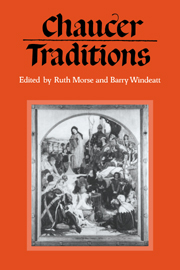Book contents
- Frontmatter
- Contents
- List of contributors
- Preface
- Note on the text
- 1 Chaucer traditions
- 2 Gower–Chaucer's heir?
- 3 Chaucer and Lydgate
- 4 Hoccleve and Chaucer
- 5 Chaucer and fifteenth-century romance: Partonope of Blois
- 6 Some Chaucerian themes in Scottish writers
- 7 The planetary gods in Chaucer and Henryson
- 8 Gavin Douglas: ‘Off Eloquence the flowand balmy strand’
- 9 Skelton's Garlande of Laurell and the Chaucerian tradition
- 10 Chaucerian metre and early Tudor songs
- 11 Aspects of the Chaucerian apocrypha: animadversions on William Thynne's edition of the Plowman's Tale
- 12 The shape-shiftings of the Wife of Bath, 1395–1670
- 13 The genius to improve an invention: transformations of the Knight's Tale
- 14 From the Clerk's Tale to The Winter's Tale
- 15 The Virtuoso's Troilus
- 16 Rewriting romance: Chaucer's and Dryden's Wife of Bath's Tale
- 17 Chaucer's religion and the Chaucer religion
- 18 A list of the published writings of Derek Brewer
- Index
17 - Chaucer's religion and the Chaucer religion
Published online by Cambridge University Press: 23 September 2009
- Frontmatter
- Contents
- List of contributors
- Preface
- Note on the text
- 1 Chaucer traditions
- 2 Gower–Chaucer's heir?
- 3 Chaucer and Lydgate
- 4 Hoccleve and Chaucer
- 5 Chaucer and fifteenth-century romance: Partonope of Blois
- 6 Some Chaucerian themes in Scottish writers
- 7 The planetary gods in Chaucer and Henryson
- 8 Gavin Douglas: ‘Off Eloquence the flowand balmy strand’
- 9 Skelton's Garlande of Laurell and the Chaucerian tradition
- 10 Chaucerian metre and early Tudor songs
- 11 Aspects of the Chaucerian apocrypha: animadversions on William Thynne's edition of the Plowman's Tale
- 12 The shape-shiftings of the Wife of Bath, 1395–1670
- 13 The genius to improve an invention: transformations of the Knight's Tale
- 14 From the Clerk's Tale to The Winter's Tale
- 15 The Virtuoso's Troilus
- 16 Rewriting romance: Chaucer's and Dryden's Wife of Bath's Tale
- 17 Chaucer's religion and the Chaucer religion
- 18 A list of the published writings of Derek Brewer
- Index
Summary
One of the most useful truisms in the study of literary reception – of the ways in which texts are read in times and places other than their own – is that reception has two aspects: it reveals something about the text itself and something about its new readers or critics. The most secure and satisfying reception-study finds these two aspects mutually explanatory. The assumption, at any rate, is that different ages or cultures do not so much misread a great text as make from it special abstractions, acutely suited to their particular concerns. The text that survives from age to age, receiving variant and sometimes antithetical interpretations, is typically not so much a compendium of perdurable truths that are sometimes misunderstood and sometimes distorted, but a structure so richly and complexly organized that different cultures, different audiences, can re-orient it (rotate it three-dimensionally as one might rotate an image in a computer) and then interpret it in ways that, however special, do answer to the work. The interpretation may often represent a very limited reception, depending on the limits of the receiving apparatus; but it receives something that is, after all, there. It responds to, and reveals, both aspects of the situation at once.
This, at least, has for a long time been the finding of leading students of the Chaucer tradition.
- Type
- Chapter
- Information
- Chaucer TraditionsStudies in Honour of Derek Brewer, pp. 249 - 262Publisher: Cambridge University PressPrint publication year: 1990



